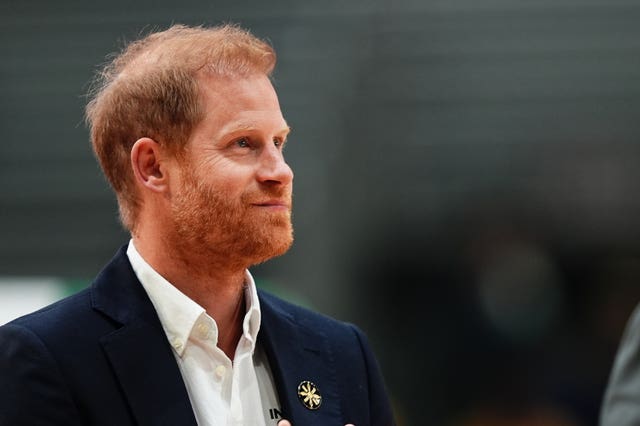A timeline of the Duke of Sussex’s legal challenge over his security in the UK
The duke is challenging a High Court ruling dismissing his legal claim over the level of taxpayer-funded security he receives while visiting the UK.

The Duke of Sussex is set to appeal against a ruling related to the level of taxpayer-funded security he receives while he is in the UK.
Last year, retired High Court judge Sir Peter Lane dismissed Harry’s challenge against the February 2020 decision of the Executive Committee for the Protection of Royalty and Public Figures (Ravec) that he should receive a different degree of taxpayer-funded protection when in the country.
Ravec has delegated responsibility from the Home Office over the provision of protective security arrangements for members of the royal family and others, with involvement from the Metropolitan Police, the Cabinet Office and the royal household.
The Court of Appeal is due to hear the challenge over two days in London, beginning on Tuesday.

Here is a timeline of the case so far:
– 2020
February
Ravec ruled that the duke will not receive the same level of taxpayer-funded personal protective security when visiting from the US, after he and the Duchess of Sussex quit as senior working royals.
They were later forced to disclose they had put in place “privately funded security arrangements” for their move to the US, after President Donald Trump said his country would not pay for their protection.
– 2021
June 30
Harry met seriously ill children and young people at a WellChild garden party and afternoon tea in Kew Gardens, west London, after returning to the UK from the US.
It is understood that photographers chased the duke’s car as he left.
September 20
The duke began legal action against the Home Office, which is legally responsible for Ravec’s decisions.
– 2022
February 18
At a preliminary hearing, Shaheed Fatima KC, representing the duke, told the High Court that Harry wanted to bring his children to visit from the US, but that he “does not feel safe” when visiting under the new security arrangements, citing the visit in June 2021.
The court also heard that Harry previously said he wanted to fund the security himself, rather than ask taxpayers to foot the bill.
He argued that his private protection team in the US does not have adequate jurisdiction abroad or access to UK intelligence information, which is needed to keep his family safe.
But Robert Palmer KC, for the Home Office, said the offer of private funding was “irrelevant”.
In written submissions, he said: “Personal protective security by the police is not available on a privately financed basis, and Ravec does not make decisions on the provision of such security on the basis that any financial contribution could be sought or obtained to pay for it.”
Mr Palmer later said in the written submissions that the duke had “failed to afford the necessary measure of respect” to the Home Secretary and Ravec.
March 24
Mr Justice Swift ruled that some documents in the case, including Harry’s witness statement, can be kept confidential.
July 7
At the first stage of the duke’s legal challenge, the High Court was told that Ravec’s decision in February 2020 was invalid due to “procedural unfairness” because Harry was not given an opportunity to make “informed representations beforehand”.
Ms Fatima said Harry was not given a “clear and full explanation” of the composition of Ravec and those involved in its decision-making, for example, that it included the royal household.

Sir James Eadie KC, for the Home Office, said in written arguments that any tensions between Harry and royal household officials were “irrelevant” to his change in status.
Lawyers for the department also said that Ravec’s decisions were taken on a “case-by-case” basis.
July 23
Mr Justice Swift allowed Harry’s legal challenge to continue “in part”, including the argument that Ravec’s decisions were legally unreasonable.
– 2023
May 16
Harry attempted to bring a second legal challenge concerning his security arrangements, asking for a judicial review over the decision not to allow him to pay privately for his protection.
Ms Fatima told the High Court that Ravec had “exceeded its authority” as “it doesn’t have the power to make this decision in the first place”.
The Home Office, which opposed Harry’s second claim, said Ravec considered it was “not appropriate” for wealthy people to “buy” protective security.
May 23
Mr Justice Chamberlain threw out Harry’s second claim, stating he could “detect nothing that is arguably irrational” in Ravec’s reasoning.
December 5
The full hearing of Harry’s claim began in London, with the court told that he was “singled out” and treated “less favourably” by Ravec’s decision, which was “unlawful and unfair”.
The hearing lasted three days, with the duke telling the court in a statement: “It was with great sadness for both of us that my wife and I felt forced to step back from this role and leave the country in 2020.
“The UK is my home. The UK is central to the heritage of my children and a place I want them to feel at home as much as where they live at the moment in the US. That cannot happen if it’s not possible to keep them safe when they are on UK soil.
“I cannot put my wife in danger like that and, given my experiences in life, I am reluctant to unnecessarily put myself in harm’s way too.”
Sir James told the court that Ravec decided that Harry would not be provided protective security “on the same basis as before” due to him no longer being a working member of the royal family and living abroad most of the time.
– 2024
February 28
Retired High Court judge Sir Peter Lane dismissed Harry’s claim, concluding Ravec’s approach was not irrational nor procedurally unfair.
April 15
Sir Peter refused to give Harry the go-ahead to challenge the ruling at the Court of Appeal.
June 6
The Court of Appeal gave Harry the green light to challenge the ruling.
– 2025
April 2
Sir Geoffrey Vos, Lord Justice Bean, and Lord Justice Edis ordered that some parts of the appeal, concerning “confidential facts”, be held in private.





